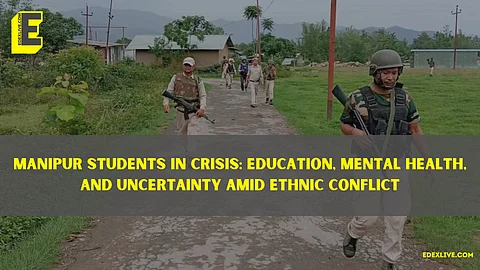

Manipur's ongoing ethnic conflict has left a devastating impact on its educational system, with widespread school and college closures, internet bans, and a generation of students facing severe mental and emotional strain.
The indefinite closure of educational institutions in curfew-hit districts — Imphal East, Imphal West, Bishnupur, Thoubal, Kakching, and Jiribam— since November 16, 2024, has further exacerbated the already precarious situation.
It may be noted that the government has now announced the opening of schools and colleges from November 29. But for the students of Manipur, this crisis is more than just a disruption to their education — it is a deepening emotional burden that is severely affecting their mental health, their future aspirations, and their sense of stability.
A generation in trauma: Mental health on the brink
The emotional and psychological toll of the ongoing violence is perhaps the most pressing concern. Professor Kham Khan Suan Hausing, former Department Head of the Political Science department, University of Hyderabad (UoH), originally from Manipur shared his insights: “The violence has radicalised the youth on both sides. The sense of insecurity is pervasive. The mental agony faced by students, especially those in the valley areas, is immense. Many young people have been pushed into violence and radicalised due to the lack of employment opportunities and the constant fear of attack.”
This radicalisation and sense of helplessness are not confined to the streets — they are deeply affecting the minds of the youth, with many feeling the pressure to defend their homes rather than focus on their education. “The violence has created mass hysteria. Youth are preoccupied with the protection of their villages and families, and the future of education seems distant,” Professor Suan continued.
The issue extends to students like a final-year student at Manipur University, who said, “My course was supposed to end in July, but we are still waiting for exams, and I don’t know when they will happen. Meanwhile, my friends who went out to study have already graduated and are working in cities like Delhi and Hyderabad. I feel like I’m falling behind.”
The persistent fear and uncertainty are also taking a heavy toll on students' mental well-being. Ruth, an Indian Administrative Service (IAS) aspirant, explained how the conflict has shattered her preparation: “I had to discontinue my classes due to the internet ban. Not only did it cost me financially, but it has also made my UPSC (Union Public Service Commission) preparation extremely difficult. I can’t even get my study materials or attend classes online. The constant anxiety, the sounds of gunfire, and the fear of the next attack are affecting my ability to focus.”
The economic divide: Poor students left behind
The divide between privileged and economically disadvantaged students has only grown wider due to the conflict. Ruth’s experience is a stark reminder of the financial strain many families in Manipur are facing.
“I come from a middle-class family, and we find it difficult to incur the cost of travel and accommodation required to reach exam centres, which are now in Aizawl. It’s draining us financially, and it’s even harder for those who don’t have the option to leave,” she says.
In contrast, students from wealthier families have managed to relocate, continuing their education in safer areas. This unequal access to education has left many students stuck in limbo, especially those from economically weaker sections. “Those who can’t leave for better opportunities remain here, but the violence and lack of opportunities make education seem like a distant dream,” said one displaced student, on the condition of anonymity.
Displacement and loss: Students bear the brunt
The crisis has forced hundreds of students into displacement. The Zomi Students' Federation (ZSF) in a collective statement for EdexLive highlighted the dire situation of students who have lost their homes and academic records in the violence.
“Many students, including those from prestigious institutions like Manipur University and Dhanamanjuri University, have been displaced,” said a spokesperson from ZSF.
“They are now scattered across other states like Mizoram, facing not only educational disruptions but also discrimination in their new institutions,” he said.
The ZSF also noted the loss of essential documents, such as mark sheets and Aadhar cards, making it nearly impossible for many displaced students to continue their studies. “These students are stuck without their academic records, unable to take a transfer or complete their education,” the spokesperson added.
The future of education: Shattered and uncertain
The closure of schools and colleges has meant that many students have had to rely on books and self-study, but for those in areas without internet, even that is a struggle. A student at Manipur University, on the condition of anonymity, lamented, “There’s no internet, no teachers, and we have no access to our libraries. I’m paying extra to study in a private library, but it’s not the same. Without expert guidance, it’s hard to prepare for exams.”
Meanwhile, the lack of online classes and teacher support is creating further isolation for students like Ruth, who had to stop her UPSC preparation and rely on self-study. “I had to quit my classes because of the internet ban. I’m now disconnected from everything I’ve worked for,” she explained.
A call for help: Restoring education and hope
The crisis has highlighted not only the inadequacies in the state’s response but also the urgent need for intervention to prevent a lost generation. Students, educators, and displaced families are calling for the restoration of internet access, the reopening of schools and colleges, and the provision of psychological support.
The government must act quickly to ensure that students, especially those displaced or from underprivileged backgrounds, do not lose their chance for a better future.
As the situation in Manipur continues to evolve, one thing is clear: the youth of the state, already burdened with violence and insecurity, cannot afford to lose any more time. Their education is at stake, and with it, their future.
